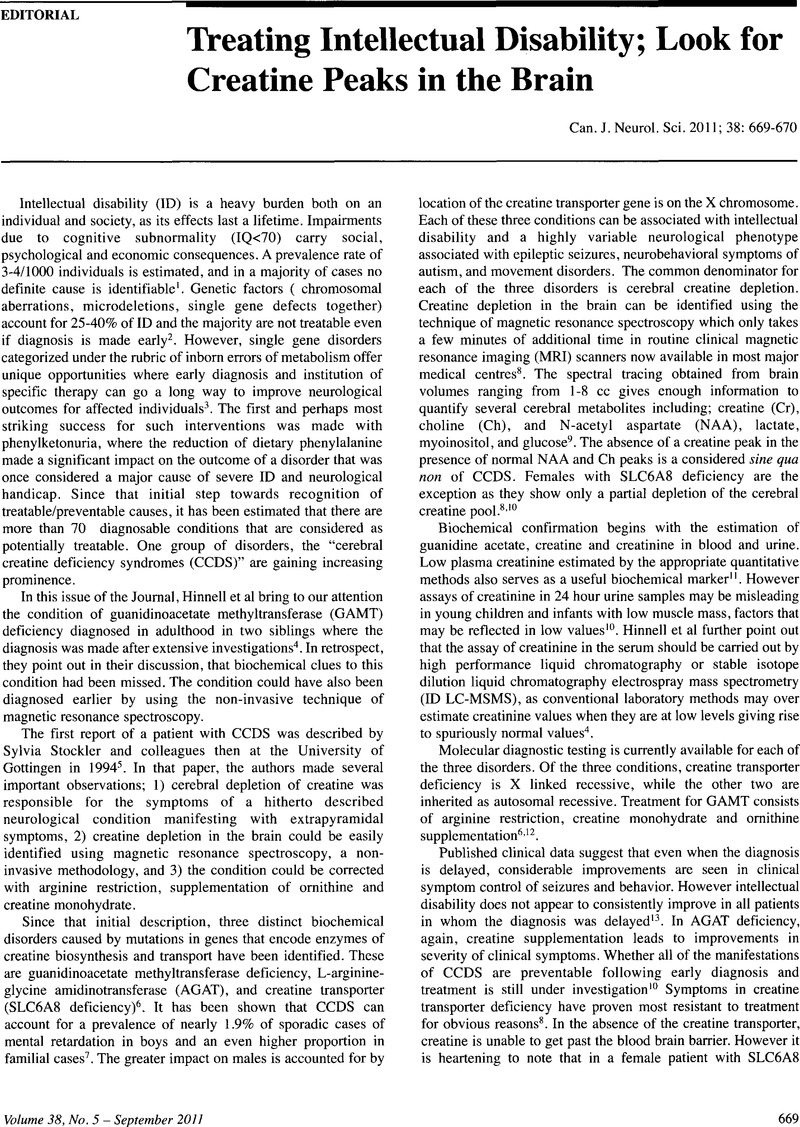No CrossRef data available.
Article contents
Treating Intellectual Disability; Look for Creatine Peaks in the Brain
Published online by Cambridge University Press: 18 February 2016
Abstract
An abstract is not available for this content so a preview has been provided. As you have access to this content, a full PDF is available via the ‘Save PDF’ action button.

- Type
- Editorial
- Information
- Copyright
- Copyright © Canadian Neurological Sciences Federation 2011
References
1.McLaren, J, Bryson, SE. Review of recent epidemiological studies of mental retardation: prevalence, associated disorders, and etiology. Am J Ment Retard. 1987;92:243–54.Google ScholarPubMed
2.Rauch, A, Hoyer, J, Guth, S, et al. Diagnostic yield of various genetic approaches in patients with unexplained developmental delay or mental retardation. Am J Med Genet A. 2006;140:2063–74.CrossRefGoogle ScholarPubMed
3.Levy, HL. Nutritional therapy for selected inborn errors of metabolism. J Am Coll Nutr. 1989;8 Suppl:54S–60.Google ScholarPubMed
4.Hinnell, C, Samuel, M, Alkufri, F, et al. Creatine deficiency syndromes: diagnostic pearls and pitfalls. Can J Neurol Sci. 2011;38(5):765–7.CrossRefGoogle ScholarPubMed
5.Stockler, S, Holzbach, U, Hanefeld, F, et al. Creatine deficiency in the brain: a new, treatable inborn error of metabolism. Pediatr Res. 1994;36:409–13.CrossRefGoogle Scholar
6.Schulze, A. Creatine deficiency syndromes. Mol Cell Biochem. 2003;244:143–50.CrossRefGoogle ScholarPubMed
7.Lion-Francois, L, Cheillan, D, Pitelet, G, et al. High frequency of creatine deficiency syndromes in patients with unexplained mental retardation. Neurology. 2006;67:1713–14.CrossRefGoogle ScholarPubMed
8.Stockler, S, Schutz, PW, Salomons, GS. Cerebral creatine deficiency syndromes: clinical aspects, treatment and pathophysiology. Subcell Biochem. 2007;46:149–66.CrossRefGoogle ScholarPubMed
9.Novotny, E, Ashwal, S, Shevell, M. Proton magnetic resonance spectroscopy: an emerging technology in pediatric neurology research. Pediatr Res. 1998;44:1–10.CrossRefGoogle ScholarPubMed
10.Mercimek-Mahmutoglu, S, Stockler-Ipsiroglu, S. Creatine deficiency syndromes. In: Pagon, RA, Bird, TD, Dolan, CR, Stephens, K, editors. Gene reviews. Seattle (WA): 1993.Google Scholar
11.Bodamer, OA, Iqbal, F, Muhl, A, et al. Low creatinine: the diagnostic clue for a treatable neurologic disorder. Neurology. 2009;72: 854–5.CrossRefGoogle ScholarPubMed
12.Schulze, A, Battini, R. Pre-symptomatic treatment of creatine biosynthesis defects. Subcell Biochem. 2007;46:167–81.CrossRefGoogle ScholarPubMed
13.Mercimek-Mahmutoglu, S, Stoeckler-Ipsiroglu, S, Adami, A, et al. GAMT deficiency: features, treatment, and outcome in an inborn error of creatine synthesis. Neurology. 2006;67:480–4.CrossRefGoogle Scholar
14.Mercimek-Mahmutoglu, S, Connolly, MB, Poskitt, KJ, et al. Treatment of intractable epilepsy in a female with SLC6A8 deficiency. Mol Genet Metab. 2010;101:409–12.CrossRefGoogle Scholar


